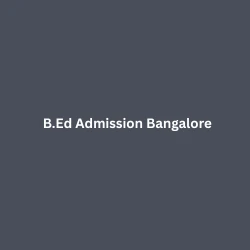Are you dreaming of a rewarding career in teaching but feeling overwhelmed by the B.Ed course admission process? You're not alone. Many aspiring educators stumble due to common missteps that can jeopardize their chances. Preparing for a Bachelor of Education (B.Ed) program requires careful planning, timely action, and a clear understanding of requirements. This article uncovers eight critical mistakes students make during B.Ed course admission and offers actionable insights to avoid them, ensuring a smoother path to your teaching goals.
Mistake 1: Ignoring Eligibility Criteria
Not Checking University Requirements
Eligibility for B.Ed course admission varies across institutions in India. Many students assume a generic bachelor's degree is enough, but specific universities may require minimum marks (e.g., 50% aggregate) or particular subjects. For instance, some institutes in B.Ed admission Bangalore demand a background in education-related fields.
Overlooking Reservation Policies
Reservation policies for SC/ST/OBC candidates can influence eligibility. Data from the National Council for Teacher Education (NCTE) shows that 15–27% of seats in government colleges are reserved. Failing to understand these nuances can lead to missed opportunities.
- Tips to Avoid:
- Verify eligibility on official university websites.
- Consult academic counselors for clarity.
- Check for subject-specific requirements.
Mistake 2: Missing Application Deadlines
Poor Time Management
Deadlines for B.Ed admission Bangalore are strict, often falling between March and June for top institutes like Bangalore University. Students who procrastinate risk missing these windows, especially when juggling multiple applications.
Not Tracking Updates
Universities frequently update admission schedules. In 2024, over 10% of applicants in Karnataka missed deadlines due to unawareness, per state education reports. Relying solely on outdated sources can derail your plans.
- Tips to Avoid:
- Create a calendar with key dates.
- Subscribe to university newsletters.
- Follow trusted education portals for alerts.
Mistake 3: Incomplete Documentation
Submitting Partial Forms
Incomplete applications are a common reason for rejection. Essential documents like mark sheets, caste certificates, or entrance exam scorecards must be submitted correctly. For example, in B.Ed admission Bangalore, missing a single document can lead to disqualification.
Not Verifying Document Authenticity
Submitting unverified or incorrect documents can result in cancellation. In 2023, over 5,000 applications nationwide were rejected due to improper documentation, according to NCTE data.
- Tips to Avoid:
- Prepare a checklist of required documents.
- Ensure all certificates are attested.
- Double-check before submission.
Mistake 4: Underestimating Entrance Exams
Lack of Preparation
Many universities require entrance exams like the Karnataka B.Ed CET or IGNOU B.Ed Entrance Test. Students often underestimate the need for focused study, assuming general knowledge suffices. In reality, these exams test teaching aptitude, reasoning, and subject knowledge.
Ignoring Exam Patterns
Not familiarizing oneself with the exam format can lower scores. For instance, the Karnataka CET includes sections on general knowledge (30%) and teaching aptitude (40%), yet many students focus only on academics.
- Tips to Avoid:
- Enroll in coaching or online prep courses.
- Practice with previous years’ papers.
- Focus on time management during exams.
Mistake 5: Choosing the Wrong College
Prioritizing Proximity Over Quality
While location matters, selecting a college solely based on convenience can compromise quality. Students in urban hubs like Bangalore often overlook reputed institutes due to travel concerns, missing out on better faculty and infrastructure.
Ignoring Accreditation
Not all B.Ed colleges are NCTE-approved. Enrolling in an unaccredited institute can render your degree invalid for government jobs. In 2024, 12% of B.Ed graduates faced job rejections due to non-accredited degrees, per MHRD reports.
- Tips to Avoid:
- Research NCTE-approved colleges.
- Check alumni reviews and placement records.
- Balance location with academic reputation.
Mistake 6: Neglecting Counseling Sessions
Skipping Pre-Admission Counseling
Counseling sessions guide students through seat allocation and course details. Many skip these, assuming they’re optional, only to miss critical updates. For example, counseling for B.Ed course admission in Karnataka often clarifies seat reservation and fee structures.
Not Preparing for Interviews
Some institutes conduct interviews during counseling. Unprepared students may struggle to articulate their teaching aspirations, reducing their chances of selection.
- Tips to Avoid:
- Attend all counseling sessions.
- Prepare for common interview questions.
- Bring all required documents to counseling.
Mistake 7: Overlooking Financial Planning
Misjudging Expenses
While this article avoids discussing specific costs, students often fail to plan for tuition, accommodation, and study materials. This oversight can lead to financial strain mid-course, especially in cities like Bangalore with higher living expenses.
Not Exploring Scholarships
Many students miss out on scholarships offered by state governments or universities. For instance, Karnataka’s Department of Education provides merit-based scholarships for B.Ed students, yet applications remain low due to unawareness.
- Tips to Avoid:
- Research scholarship opportunities early.
- Budget for all course-related expenses.
- Contact colleges for financial aid options.
Mistake 8: Lack of Career Clarity
Unclear Teaching Goals
Some students pursue B.Ed without a clear vision of their teaching career. This lack of focus can lead to disinterest or dropping out. In India, 8% of B.Ed students discontinue their studies due to mismatched expectations, per a 2023 UGC survey.
Not Researching Job Prospects
Understanding the demand for teachers in specific subjects or regions (e.g., STEM in urban schools) is crucial. Without this, students may struggle to find relevant opportunities post-graduation.
- Tips to Avoid:
- Reflect on your teaching aspirations.
- Research job markets in your preferred region.
- Seek guidance from current teachers.
Conclusion
Navigating B.Ed course admission can be challenging, but avoiding these eight mistakes can set you on the right path. From verifying eligibility to preparing for entrance exams and choosing the right college, every step counts. Take proactive measures, stay informed, and align your efforts with your teaching goals. Ready to start your journey? Begin by researching NCTE-approved colleges and crafting a solid preparation plan today.
FAQs
1. What is the eligibility for B.Ed course admission in India?
Eligibility typically includes a bachelor’s degree with at least 50% marks from a recognized university. Some institutes may require specific subjects or teaching experience. Always check the university’s official website for precise criteria.
2. How can I prepare effectively for B.Ed entrance exams?
Focus on general knowledge, teaching aptitude, and subject-specific topics. Practice with past papers, enroll in coaching if needed, and manage your time during the exam to maximize your score.
3. Are there scholarships available for B.Ed students in Bangalore?
Yes, many universities and state governments offer scholarships based on merit or financial need. Contact your chosen institute or check Karnataka’s education department portal for details.
4. Why is NCTE accreditation important for B.Ed colleges?
NCTE accreditation ensures the degree is recognized for government teaching jobs. Without it, your qualification may not be valid for certain positions, limiting career options.
5. Can I apply to multiple B.Ed colleges simultaneously?
Yes, you can apply to multiple colleges, but ensure you track deadlines and meet each institute’s specific requirements to avoid application rejections.


